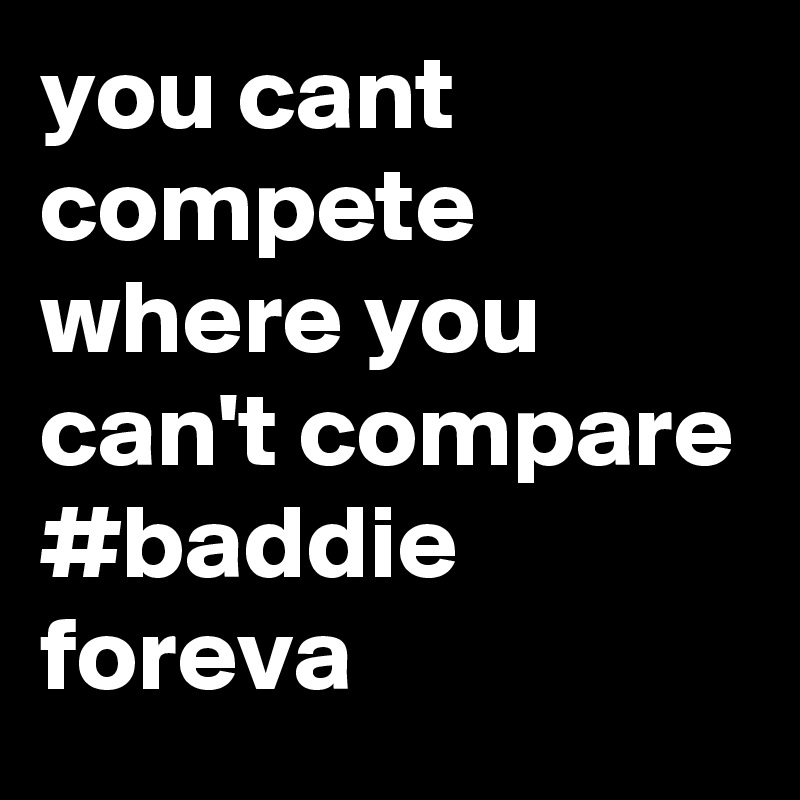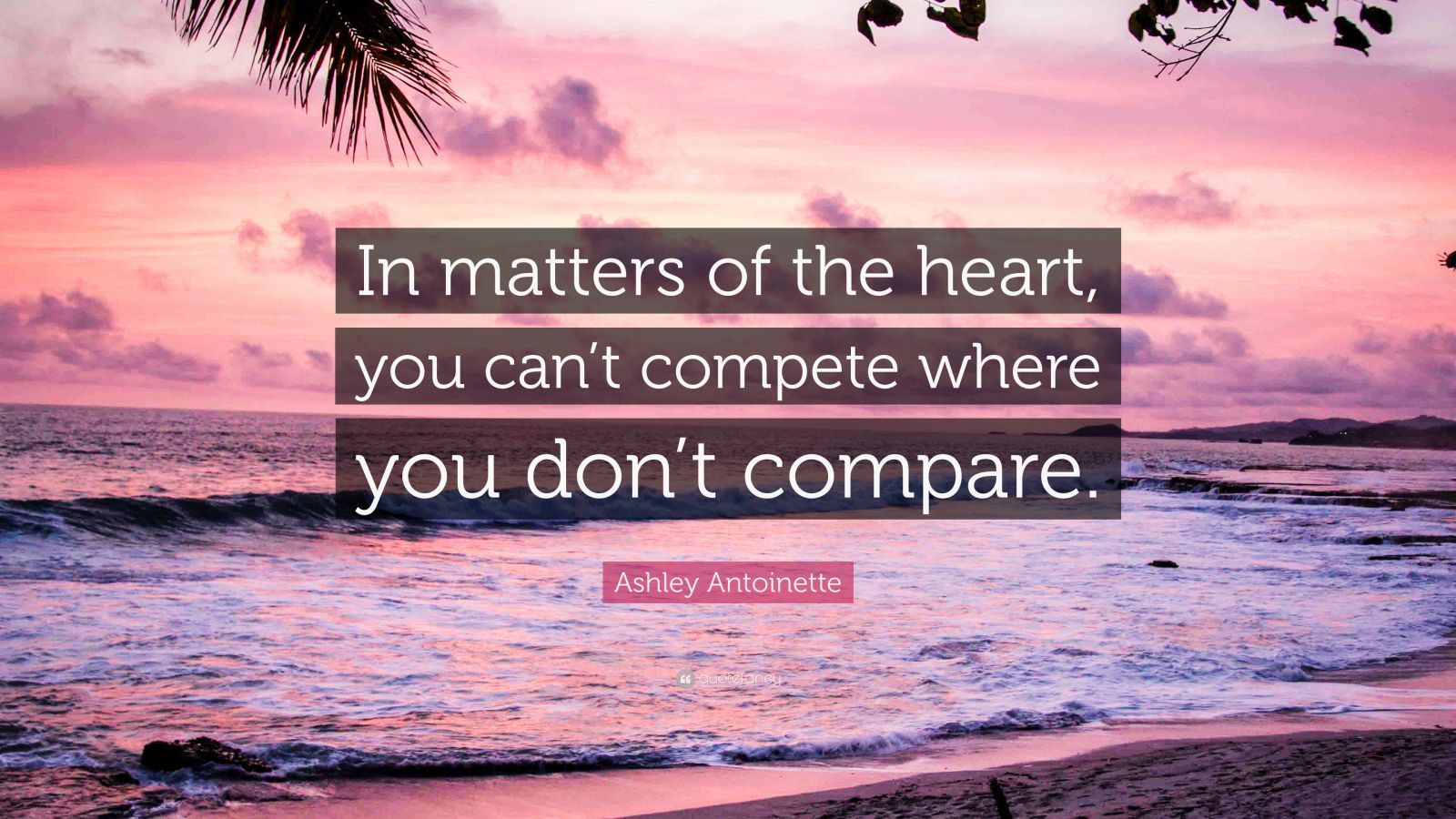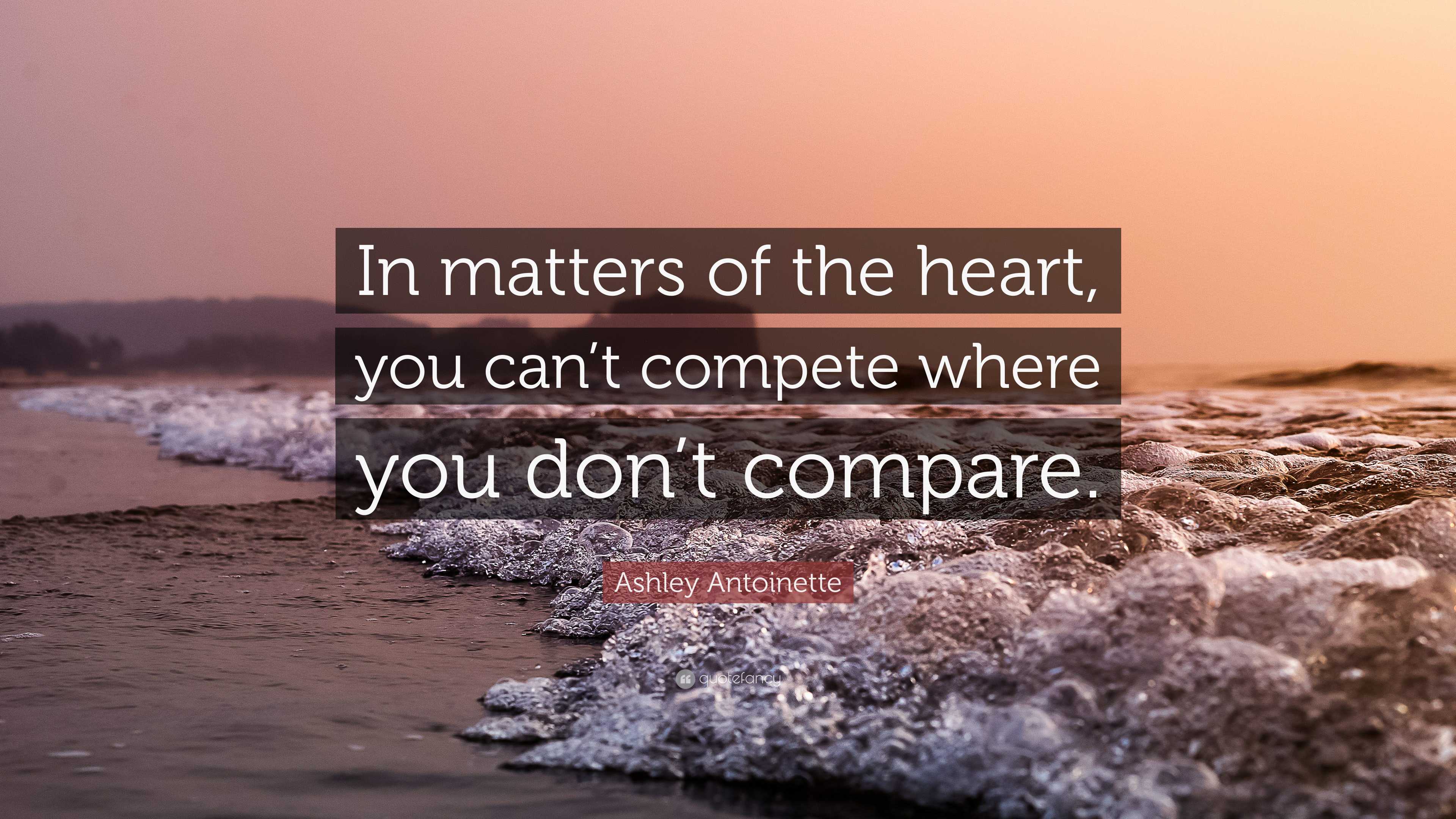Ever heard the phrase "can't compete where you don't compare"? If you're scratching your head right now, don't worry—you're not alone. This saying has been making rounds in business circles, personal development blogs, and even casual conversations. It's a phrase that carries weight, but what exactly does it mean? Let me break it down for you in the simplest way possible. This phrase talks about the importance of understanding where you stand in relation to others. If you don't know how you measure up, how can you even begin to compete?
Now, let's zoom in on why this concept matters so much. Whether you're running a business, climbing the corporate ladder, or just trying to improve yourself, competition is inevitable. But here's the catch—blind competition without proper comparison can lead to disaster. Think of it like entering a race without knowing the distance or the other runners. You'll end up exhausted, confused, and probably last place. Sound familiar? Yeah, we've all been there.
So, buckle up because we're diving deep into the meaning of "can't compete where you don't compare" and how it applies to your life. This article will cover everything from its origins to practical applications, with a sprinkle of humor and relatable examples. By the end, you'll have a solid grasp of this concept and how to use it to your advantage. Ready? Let's go!
- Oprahs Real Name Unveiling The Icons True Identity
- Kannada Prabha Kannada Newspaper Your Ultimate Source For Local And Global News
Here's a quick table of contents to guide you through:
- Understanding the Basics of Can't Compete Where You Don't Compare
- The Origins of the Phrase
- Why Comparison Matters in Competition
- Common Misconceptions About Comparing
- How to Compare Effectively
- The Role of Self-Awareness
- Practical Tips for Healthy Competition
- Can't Compete Where You Don't Compare in Business
- Personal Growth and the Comparison Game
- Conclusion: Putting It All Together
Understanding the Basics of Can't Compete Where You Don't Compare
At its core, "can't compete where you don't compare" is about awareness. It's the idea that before you jump into any competitive arena—whether it's a business market, a sports event, or even a personal challenge—you need to know what you're up against. Without understanding the landscape, you're essentially flying blind.
Think about it like this: imagine you're planning to launch a new product. You've poured your heart and soul into it, but you haven't looked at what your competitors are doing. Chances are, your product might not resonate with the audience as much as you hoped. Why? Because you didn't compare. You didn't see where you fit in the bigger picture.
- Unlocking The Mystery Of Senta Berga A Journey Beyond The Ordinary
- G59 Meaning Unlocking The Mystery Behind The Code
Now, let's break it down further. Comparing doesn't mean copying. It means analyzing, understanding, and learning. It's about finding your unique strengths and weaknesses in relation to others. This kind of insight is invaluable, especially when you're trying to carve out a niche for yourself.
The Origins of the Phrase
Where did this phrase come from? Well, like many catchy sayings, it's hard to pinpoint an exact origin. However, it gained traction in business and leadership circles over the past few decades. The idea behind it is rooted in strategic thinking and competitive analysis.
Back in the day, businesses relied heavily on market research to understand their competitors. This involved gathering data, analyzing trends, and identifying gaps in the market. The phrase "can't compete where you don't compare" became a shorthand for this process. It reminded entrepreneurs and leaders that competition isn't just about showing up—it's about showing up prepared.
Today, the phrase has expanded beyond business. It's now used in personal development, sports, education, and even social media. Why? Because the principle remains the same: you need to know where you stand before you can move forward.
Why It Became Popular
- It resonates with people who value preparation and strategy.
- It emphasizes the importance of self-awareness and market awareness.
- It's easy to remember and apply in various contexts.
Why Comparison Matters in Competition
Let's talk about why comparison is such a big deal in competition. At first glance, comparing might seem like a negative thing. After all, we've all heard the saying, "Comparison is the thief of joy." But here's the thing: healthy comparison can be incredibly empowering.
When you compare effectively, you gain clarity. You see what others are doing well, where they're falling short, and how you can differentiate yourself. This kind of insight allows you to make informed decisions and take strategic actions. Without comparison, you're just guessing—and guessing rarely leads to success.
Take the tech industry, for example. Companies like Apple, Google, and Microsoft are constantly comparing their products and services. They analyze market trends, customer feedback, and competitor moves to stay ahead. Without this level of comparison, they wouldn't be able to innovate and stay relevant.
Key Benefits of Comparing
- Identifies strengths and weaknesses.
- Highlights opportunities for improvement.
- Encourages creativity and innovation.
- Builds confidence through informed decision-making.
Common Misconceptions About Comparing
Before we dive deeper, let's address some common misconceptions about comparing. Many people shy away from comparison because they associate it with negativity. But here's the truth: comparison isn't inherently bad. It's all about how you approach it.
Misconception #1: "Comparing means copying." Nope! Comparing is about learning and adapting, not copying. It's about using others' successes and failures as a guide to shape your own path.
Misconception #2: "Comparing leads to jealousy." Not if you do it right! Healthy comparison is about growth, not envy. It's about using others' achievements as motivation to improve yourself.
Misconception #3: "Comparing is a waste of time." On the contrary, comparing is a valuable investment. It saves you time and resources in the long run by helping you avoid mistakes and capitalize on opportunities.
How to Avoid Negative Comparisons
- Focus on progress, not perfection.
- Set realistic goals based on your own circumstances.
- Use comparison as a tool, not a weapon.
How to Compare Effectively
Now that we've established why comparing matters, let's talk about how to do it effectively. Effective comparison isn't about obsessing over others; it's about gaining actionable insights. Here's a step-by-step guide:
Step 1: Define Your Goals. What are you trying to achieve? Whether it's growing your business, improving your skills, or achieving a personal milestone, clarity is key.
Step 2: Identify Your Competitors. Who are the people or companies you're up against? Make a list of those who are excelling in your desired area.
Step 3: Analyze Their Strengths and Weaknesses. Look at what they're doing well and where they're falling short. This will help you identify gaps and opportunities.
Step 4: Find Your Unique Selling Point. What sets you apart from the competition? Use this to differentiate yourself and stand out.
Tools for Effective Comparison
- Market research tools like SEMrush and Ahrefs.
- Customer feedback surveys.
- Competitor analysis reports.
The Role of Self-Awareness
Self-awareness is the foundation of effective comparison. Without it, you're just comparing apples to oranges—or worse, oranges to bananas. Self-awareness means understanding your own strengths, weaknesses, and limitations. It allows you to compare in a way that's meaningful and actionable.
Here's a fun analogy: think of self-awareness as a mirror. It reflects who you are, where you're at, and where you want to go. When you look in the mirror, you see the truth—warts and all. This clarity is essential for making progress.
So, how do you develop self-awareness? Start by asking yourself tough questions. What are you good at? What do you struggle with? What motivates you? The more honest you are with yourself, the better you'll be at comparing effectively.
Practical Tips for Healthy Competition
Now that you know the importance of comparing, let's talk about how to apply it in real life. Here are some practical tips for healthy competition:
Tip #1: Set Clear Objectives. Know what you're competing for and why it matters. This will keep you focused and motivated.
Tip #2: Celebrate Small Wins. Progress is progress, no matter how small. Recognizing your achievements will boost your confidence and drive.
Tip #3: Learn from Failure. Failure is not the end—it's a stepping stone. Use setbacks as opportunities to learn and grow.
Tip #4: Stay Grounded. Remember that competition is just one aspect of life. Don't let it consume you.
Examples of Healthy Competition
- A business owner analyzing customer reviews to improve their product.
- An athlete studying their competitors' techniques to enhance their performance.
- A student comparing study habits to boost their academic results.
Can't Compete Where You Don't Compare in Business
In the world of business, the phrase "can't compete where you don't compare" is gospel. Entrepreneurs and leaders know that success doesn't happen by accident—it happens through strategic planning and analysis. Here's how this concept plays out in the business world:
First, businesses need to understand their market. This involves gathering data on customer preferences, industry trends, and competitor moves. Without this information, they're flying blind. Second, businesses need to identify their unique value proposition. What makes them different from the competition? This differentiation is what attracts customers and drives growth.
Take Amazon, for example. They didn't become the world's largest online retailer by accident. They did it by constantly comparing and improving. They analyzed customer feedback, optimized their logistics, and expanded their product offerings. All of this was possible because they compared effectively.
Key Strategies for Business Success
- Conduct regular market research.
- Stay updated on industry trends.
- Invest in innovation and technology.
Personal Growth and the Comparison Game
While the phrase "can't compete where you don't compare" is often used in business, it applies just as much to personal growth. Whether you're trying to improve your fitness, develop a new skill, or achieve a personal milestone, comparison can be a powerful tool.
For instance, if you're trying to get in shape, comparing your progress to others can be motivating. Seeing how far they've come can inspire you to push harder and stay committed. Of course, it's important to compare in a healthy way—focus on progress, not perfection.
Similarly, if you're learning a new skill, comparing your work to experts can help you identify areas for improvement. It can also show you what's possible with dedication and practice.
Conclusion: Putting It All Together
So, there you have it—a comprehensive look at "can't compete where you don't compare" and its meaning. Whether you're in business, personal development, or just trying to navigate life, this concept is invaluable. It reminds us that competition isn't just about showing up—it's about showing up prepared.
Here's a quick recap of what we covered:
- Comparison is essential for effective competition.
- Self-awareness is the foundation of healthy comparison.
- Practical tips and strategies can help you compete more effectively.
- This concept applies to both business and personal growth.
Now, it's your turn to take action. Start by defining your goals and identifying your competitors. Then, analyze their strengths and weaknesses to find your unique edge. Remember, the key is to compare in a way that empowers you, not discourages you.
So, what are you waiting for? Go out there and make it happen. And don't forget to share



Detail Author:
- Name : Katherine Thiel
- Username : slangworth
- Email : ewilderman@yahoo.com
- Birthdate : 1979-08-07
- Address : 25841 Gerry Mews Lake Stephonborough, DC 10820-1190
- Phone : +17153979139
- Company : Wilkinson, Denesik and McDermott
- Job : Infantry
- Bio : Dolores cum deleniti nam ut est eligendi voluptas. Nesciunt adipisci minus et veniam autem qui voluptas officia. Ea architecto aut sed porro dolore perspiciatis.
Socials
tiktok:
- url : https://tiktok.com/@runolfsson1988
- username : runolfsson1988
- bio : Aut occaecati repellendus eligendi dolores.
- followers : 4703
- following : 257
facebook:
- url : https://facebook.com/daisha2805
- username : daisha2805
- bio : Eos corrupti quia exercitationem dolore ut et.
- followers : 2107
- following : 344
linkedin:
- url : https://linkedin.com/in/daisha.runolfsson
- username : daisha.runolfsson
- bio : Voluptas voluptas et quam non suscipit ut.
- followers : 5313
- following : 815
instagram:
- url : https://instagram.com/drunolfsson
- username : drunolfsson
- bio : Hic dolor nostrum commodi asperiores laborum. Sed eligendi et at consequatur sint rerum.
- followers : 6641
- following : 1220
twitter:
- url : https://twitter.com/daisha_official
- username : daisha_official
- bio : Vel quibusdam aliquid praesentium quasi. Animi itaque totam ex aut. Voluptatum molestias earum enim natus qui quia. Aut similique labore eius voluptas.
- followers : 3085
- following : 1842